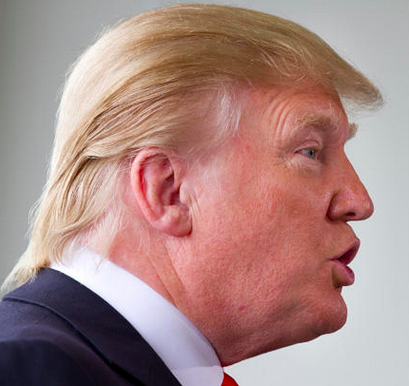 aNewDomain commentary — Donald Trump is a nativist asshole. Why is he leading in the polls, and what does this say about Americans and/or Republicans?
aNewDomain commentary — Donald Trump is a nativist asshole. Why is he leading in the polls, and what does this say about Americans and/or Republicans?
Analysts and pundits are obsessing over these questions even more now that the real estate developer billionaire candidate seemed to have jumped the political shark with his statement that he wants to ban Muslims from emigrating to or even merely visiting the United States as tourists.
Some writers called that the beginning of the end, yet his poll numbers shot up as a result.
Are likely Republican primary voters a bunch of xenophobes and racists? Yes, that’s part of it. The GOP has a long, sorry history of race-baiting and bigotry. A 2012 AP poll found that 79 percent of Republicans are racist, compared to 32 percent of Democrats.
There’s nothing new about Republican racism.
But Trumpism, being increasingly compared to fascism, is clearly a new phenomenon in modern American politics, which had seemed to be moving away from the charismatic populist Huey Long- and Ross Perot-types and increasingly toward the bland European postwar technocrat model epitomized by U.S. President Barack Obama.
Experts are struggling to explain the effectiveness of Trump’s special sauce — militant xenophobia with a dual focus on keeping out Muslims (because some might be terrorists) and throwing out Mexicans (because some are rapists and others are drug dealers).
He’s soaring, month after month — despite being untelegenic, way short on specifics, obviously ignorant and getting caught repeatedly for lying.
So why is Trump having so much success, despite all these shortcomings?
Mark Krikorian of the anti-immigration group Center for Immigration Studies comes the closest of anyone to the answer — but even he doesn’t fully get The Donald’s appeal.
“Every society needs elites, but our elites have come to reject the basic worldview of the people they purport to lead,” Krikorian writes, adding:
We have, as the late Samuel Huntington wrote, a patriotic public and a post-American, post-national elite that is mystified, at best – and disgusted, at worst – at the public’s demand that our government put the interests of Americans first. This disconnect is why immigration policy is at the core of Trump’s success.”
Absolutely right. But then, Krikorian goes a little off the rails:
Mass immigration is perhaps the most potent symbol of the elite’s unconcern with America’s sovereignty and the well-being of ordinary people. Many Americans – not just Republicans but also independents and some Democrats – want policies that promote America’s sovereignty and self-determination. Our elites are more out-of-step with the public on immigration than on any other issue. The Chicago Council of Foreign Affairs surveyed both the public and opinion leaders on a variety of issues broadly related to foreign policy and found the biggest gaps on immigration policy.”
More from Krikorian: “Even questions like support for the United Nations or support for foreign aid didn’t show as big a gap as immigration. Surveys of specific constituencies found the same thing. Whether union leaders vs. union members, religious leaders vs. their members, or minority leaders vs. minority voters, the results were the same – huge gaps between the demands of ordinary people for tighter borders and commitment to American workers vs. elite preference for amnesty, loose borders and increased immigration.”
Krikorian is right: Illegal immigration is a symbol, but it’s not the big problem itself.
Numerous studies have shown that illegal immigration has a neutral or even upward effect on the wages of legal citizens working in the United States. Overall, however, real wages of U.S. workers have been stagnant or declining since the 1970s, while the richest one percent and superrichest one percent of one percent have seen a massive surge in income and wealth.
Elections are mostly about pocketbook issues, and 2016 is no exception. Adding to pressure on average American workers is the fact that, since the 2008-09 financial crisis, credit has been extremely difficult to obtain. Not only are you losing ground to inflation year after year, you’ve maxed out your credit card and the banks aren’t sending you any new ones.
Worries about declining living standards are at the top of the concerns of American voters.
But neither the Democratic nor Republican parties are talking, much less doing anything about, people’s fears that they and their children will keep finding it harder and harder to pay their bills.
It is true that the borders have been open for years, as Trump says. The two parties have long been perfectly fine with this. The Republicans’ business allies like the cheap labor, and Democrats think second-generation Latinos are likelier to vote for them.
But as I said above, open borders are only a symbol, particularly now that the U.S. economy is so bad that more Mexicans are going back home than coming here.
Both parties have also been in cahoots on free trade. From NAFTA to the TPP (Trans Pacific Partnership), the Ds and Rs in Congress have rubberstamped every proposal to liberalize trade.
But these deals are terrible for American workers, not least because they outsource U.S. jobs overseas.
Trump is the first major candidate in years to oppose such free trade deals, saying he would kill both NAFTA and the TPP.
I am all for free trade, but it’s got to be fair. When Ford moves their massive plants to Mexico, we get nothing. I want them to stay in Michigan,” Trump said.
Poor and working-class voters, many of whom are backing Trump right now, have long opposed free trade agreements.
Bernie Sanders also opposes free trade. Interestingly, according to the numbers, Sanders would beat Trump in a head to head contest, whereas Hillary Clinton would not.
I would modify Krikorian’s thesis to say that Trumpism is the primal scream of an American public sick and tired of politicians who don’t put the interests of American workers first.
For aNewDomain, I’m Ted Rall.













